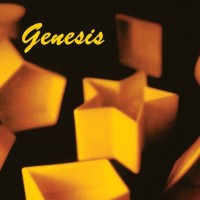Though the popular consciousness has placed the terminating line between Prog Genesis and Pop Genesis at the moment in which Peter Gabriel packed up his flower outfit and split, the truth is the group underwent a slower evolution.
In fact, a fairer demarcation is really when producer David Hentschel, who had to that point helmed all of Genesis’s post-Gabriel albums, split after 1980’s Duke. That opened the door for Hugh Padgham, who engineered 1981’s Abacab (after working with Collins on his Face Value solo project) and then produced the rest of Genesis’ 1980s output.
By the time he was finished, Genesis had transformed itself into a pop-music hit factory.
Still, it wasn’t all “Invisible Touch” and “That’s All.” (We’re going to leave “Illegal Alien” out of this conversation, having already stirred up a hornet’s nest there.) In fact, even during the band’s most craven era of MTV pandering, there were moments when Genesis still could approximate its earlier prog-rock grandeur …
“DOMINO,” (INVISIBLE TOUCH, 1986): We join a visceral, living nightmare already in progress, as the narrator of this musically layered, emotionally gripping storysong waits — with an ever-growing sense of impending doom — for the return of lover. Suddenly, an apocalyptic scene erupts all around, with knifing images of battle-torn drama giving unfortunate shape to his worst fears.
That keyboardist Tony Banks composed these lyrics while thinking of the then-ongoing 1982 Lebanon War, then, comes as no surprise — nor the larger theme here of a domino effect taking violence from one country to another, from one home to another, from one heart to another. That this song appears adjacent to the pervy “Anything She Does,” well, that’s an argument for another day, I suppose.
[SOMETHING ELSE! INTERVIEW: Anthony Phillips, Genesis’ original guitar player, talks about the group’s embryonic early days – and why he doesn’t see them reuniting again.]
“ABACAB,” (ABACAB, 1981): This was a canny melding of new-wave synth sounds — crunchy and stripped down, they are as piercing as any guitar riff ever was — and the mid-period Genesis aesthetic. Listen as “Abacab” elongates into a thrilling rhythmic interlude, one that allows Banks a rare moment of free-form improvisation, and it’s difficult to believe even now that much of the rest of this project is given over to a glossy pop asides.
Critics charge that the lyrics are cellophane-wrapped gobbledy gook, and weed-stoked arguments about how the title may — or may not!! — refer to its song structure likely continue. The truth is, all that meant little as this ferocious, utterly new sounding exploration initially unfolded. Fast forward to 2006, however, as the group’s trio lineup reunited and their sense of wonder had long since vanished. Collis reportedly stopped initial rehearsals midway through the first verse of “Abacab” — saying: “I don’t really want to sing this. I don’t know what it’s about.” No shit, man.
[SOMETHING ELSE! REWIND: We recently dug into deep cuts from across the solo Genesis repertoire, uncovering overlooked favorites from Peter Gabriel, Phil Collins and Steve Hackett.]
“ONE MAN’S FOOL,” (CALLING ALL STATIONS, 1997): The closing track from an admittedly uneven album gives new life to the argument that this edition of Genesis — and one-album frontman Ray Wilson — never quite got a fair shake. “One Man’s Fool” would have been a canny post-911 exploration of the mistakes made from indiscriminate retaliation — except that it was composed and recorded well before that era. Wilson offers the lyric with a confidential insistence, far more in keeping with Gabriel’s approach than the departed Collins, and Nick D’Virgilio (of Spock’s Beard fame) does a credible impersonation of the angular drumming style that Collins made famous.
And yet this song, this album and this lineup quickly sank without a trace? “I look at it as an unfinished job,” Wilson told me, in an exclusive SER Sitdown. “We made a good start and then they gave up, that’s my view. When replacing someone as talented and famous as Phil, it’s going to take time and patience. However, I think we did a good album together, so that’s what really matters to me.”
[SOMETHING ELSE! INTERVIEW: We caught up with Genesis’ Ray Wilson only to find him in a relaxed and centered mood. Things finally seem to be breaking his way again.]
“NO SON OF MINE,” (WE CAN’T DANCE, 1991): A sentimental exploration of Mike Rutherford’s uncommunicative relationship with his father had already catapulted his side band to the top of the charts. This track takes a far different tack, leaving aside the redemptive qualities of Mike and the Mechanics’ “Living Years” for a more serrated moment of real-world emotional damage: Thrown out of his house after a vaguely drawn moment of domestic violence, this son eventually works up the nerve to return — only to find things sadly unchanged.
Just as interesting is the musical setting, in particular at this late date for Genesis. Banks unleashes a keyboard stab dubbed “elephantus” by the band, even as tick-tocking cadence imbues everything with deadly apprehension — and Collins adds one of his most committed vocal turns in years. Banks sampled a riff from Rutherford, and then lowered the pitch by playing it on the low end of his keyboard, perfectly encapsulated the grinding sense of defeat surrounding this scene.
[SOMETHING ELSE! INTERVIEW: Former Genesis guitarist Steve Hackett talks about the deep impact of J.S. Bach on his musical life, and what has become a lasting passion for his old band.]
“HOME BY THE SEA/SECOND HOME BY THE SEA” (GENESIS, 1983): Crunchy and limber, then spacey and a bit progressive — and with a spooky theme to boot — this pair of songs (combined, they are more than 11 minutes long) represents perhaps the last rickety bridge between Genesis’s two music-making periods. With Padgham on board, Genesis would include the prominent use of a drum machine (“Mama”), a catchy Top 10-hit in “That’s All” and a radio-ready ballad in “Taking It All Too Hard.” Yet there were still glimmers of what had come before, and “Home by the Sea” is one of them.
That starts with the theme, which amounts to a ghost story: New tenants — or, perhaps burglars? — enter a seaside dwelling, only to be greeted by spirits from beyond. These ghosts have stories to relate, many of them. In the telling, however, the visitors become entrapped inside the haunted house, as well. Banks, who composed the lyrics, is particularly effective during the extended instrumental passage that links the two tracks. Collins had, by then, also developed into a singer of newfound range (angrily imploring his new visitors to “sit down, sit down … sit down!”) but, more importantly, the song retains a distinctive musical character that rounds out the narrative — very in keeping with the Genesis era then drawing to a close.
[amazon_enhanced asin=”B000WTZ78O” container=”” container_class=”” price=”All” background_color=”FFFFFF” link_color=”000000″ text_color=”0000FF” /] [amazon_enhanced asin=”B00122RQ8E” container=”” container_class=”” price=”All” background_color=”FFFFFF” link_color=”000000″ text_color=”0000FF” /] [amazon_enhanced asin=”B000002JDT” container=”” container_class=”” price=”All” background_color=”FFFFFF” link_color=”000000″ text_color=”0000FF” /] [amazon_enhanced asin=”B000WTZ78Y” container=”” container_class=”” price=”All” background_color=”FFFFFF” link_color=”000000″ text_color=”0000FF” /] [amazon_enhanced asin=”B000WTZ78E” container=”” container_class=”” price=”All” background_color=”FFFFFF” link_color=”000000″ text_color=”0000FF” /]
- Nick DeRiso’s Best of 2015 (Rock + Pop): Death Cab for Cutie, Joe Jackson, Toto + Others - January 18, 2016
- Nick DeRiso’s Best of 2015 (Blues, Jazz + R&B): Boz Scaggs, Gavin Harrison, Alabama Shakes - January 10, 2016
- Nick DeRiso’s Best of 2015 (Reissues + Live): John Oates, Led Zeppelin, Yes, Faces + others - January 7, 2016




I lived through the gabriel to collins morph and I liked both the progressive weirdness of the old and the hit factory stuff of the new. but it was two different bands. I completely agree with home by the sea being a high point of the latter period though. one of my favorite genesis songs of any period.